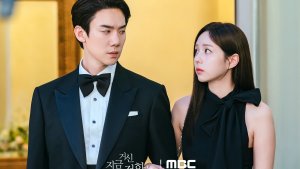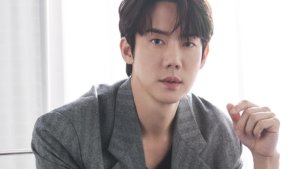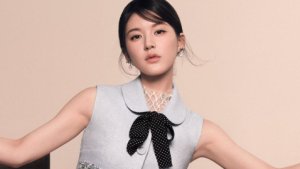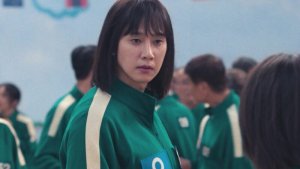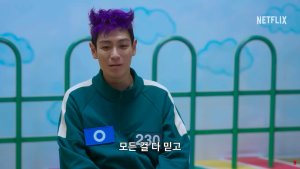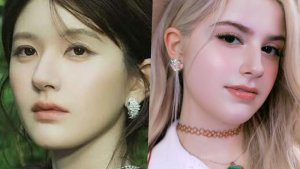 Late actress Kim Soo Mi's comedy K-movie 'Ghost Police' drops stills
Late actress Kim Soo Mi's comedy K-movie 'Ghost Police' drops stills
Mr. Plankton's writer Jo Yong shares what she wanted to convey through the Netflix K-drama.
Mr. Plankton tells the story of Hae Jo (Woo Do Hwan), a man plagued by misfortune, who is forced to embark on the final journey of his life alongside Jo Jae Mi (Lee You Mi), the most unfortunate woman.
The journeys of Hae Jo, Jae Mi, and Eo Heung — characters who ultimately discover the meaning and value of life — have been brought to life with extraordinary depth by the stellar performances of Woo Do Hwan, Lee You Mi, Oh Jung Se, and Kim Hae Sook.
The story of Hae Jo, a man wandering aimlessly through life, like a plankton, and Jae Mi, a woman yearning desperately for a family to share warmth with, follows two people burdened with misfortune as they find happiness within each other despite their hardships. Their journey delivers a powerful message: "We are all shining and precious beings, each born with value and purpose."
Writer Jo Yong shared her intentions behind writing Mr. Plankton in an interview. Here is the Q&A she had with local media.
Q. What did you want to tell through Mr. Plankton?
Plankton are at the bottom of the marine food chain, perhaps the humblest [lowest in the hierarchy] of all beings. Yet, the fact that this vast Earth's ecosystem is sustained by the oxygen they produce is truly amazing. These seemingly trivial beings felt admirable and lovable to me. And the thought occurred to me that every being on this planet deserves honor.
Still, I [used to] often find myself lamenting: 'Why was someone like me even born? I have no talent. Nothing I'm particularly good at. And nothing I truly want to do. My life feels so dull.' I wanted to depict the aimless wandering and drifting of those who, like microorganisms, merely float through life, living as life carries them.
I wanted to thrust them into chaotic circumstances, full of variables, tumbling and tossing them about. Just as grains are separated from chaff when shaken intensely on a sieve, perhaps by rolling, clashing, and struggling on life's harsh roads, they, too, might come to realize something: there is no one in this world who should not have been born [everyone is born with a purpose]. Today, because of someone as insignificant as you, someone by your side might have been filled with happiness.
Director Hong Jong Chan also echoed the same sentiment during the K-drama's press conference, saying, "While plankton may be tiny and nearly invisible, it plays a vital role in producing oxygen, helping sustain life on Earth. The title suggests that everyone, no matter how small they feel, plays an essential role in the world."
Our series is the fervent reflection and retrospective of a youth who, nearing the end of life, comes to realize the value of his existence. People have asked me whether our series has a sad ending or a happy ending. In response, I once said that in this world, memories left behind by those who live and those who have lived are intertwined, so there is no such thing as a final ending.
Therefore, I described our series as a 'never-ending' story. So, I hope our viewers won't be sad for too long. Hae Jo is still, and always will be, with us.
Q. What is the meaning behind the title?
The term Plankton originates from a Greek word meaning 'to wander aimlessly without a destination' or 'wanderer.' With this in mind, we used the title to refer to a wanderer born without [family] roots, with the prefix 'Mr.' attached to refer to Hae Jo. On a broader scale, apart from Hae Jo, it also represents Jae Mi, Eo Heung, Ho Ja, Ka Ri, John Na, and all the others who have embarked on the road, each with their own big and small flaws and imperfections. It could even symbolize all humans who drift through the long journey of life [searching for meaning in it].
 Q. Hae Jo and Jae Mi find happiness in each other despite their misfortunes. Was there a message you wanted to convey through this?
Q. Hae Jo and Jae Mi find happiness in each other despite their misfortunes. Was there a message you wanted to convey through this?
Hae Jo, born without [family] roots, does not settle on anything or attach meaning to anything. Yet, through his final journey with Jae Mi, he begins to feel a newfound attachment and longing for life. He wishes to love more, to live one more day. He comes to cherish the things he once took for granted or neglected. Through this, he comes to appreciate the value of life and the true meaning of love.
Jae Mi, on the other hand, had her dream of becoming a mother shattered. However, through Hae Jo, she realizes that what she truly longed for wasn't to be a 'mother' per se but to be someone who receives and gives unconditional love. And it is through Hae Jo that her dream is finally fulfilled.
Q. It seems that spaces like Hae Jo's 'Errand House' and Jae Mi's family house carry significant meaning for the two characters. What does 'home' mean to them?
For the two protagonists, 'home' seems to represent a fictional space they deeply desired but never truly had. It's why Hae Jo tells Jae Mi that he named his place 'Errand House' rather than an 'Errand Center'. Perhaps both characters longed for a warm, family-filled 'sweet home'. That's why Hae Jo created his Errand House, and Jae Mi tried so hard to enter her family house.
But in the end, neither space was truly their home, and they were destined to wander together. There's a line from Hae Jo that captures this sentiment: 'Do you think I'm here because I have nowhere else to go? I'm just standing still because there's nowhere I want to go.'
Q. A word to viewers around the world who loved Mr. Plankton?
To viewers from around the world, thank you so much for loving Hae Jo, Jae Mi, Eo Heung, and all the other characters, and for passionately cheering them on on their journey of growth, however imperfect they might be. Thanks to director Hong Jong Chan, the staff who toiled alongside us — eating, resting, running, and enduring on the road like Hae Jo and Jae Mi — as well as our flawless cast, we were able to successfully complete this long journey. Once again, I thank you from the bottom of my heart.
 Source
Source




